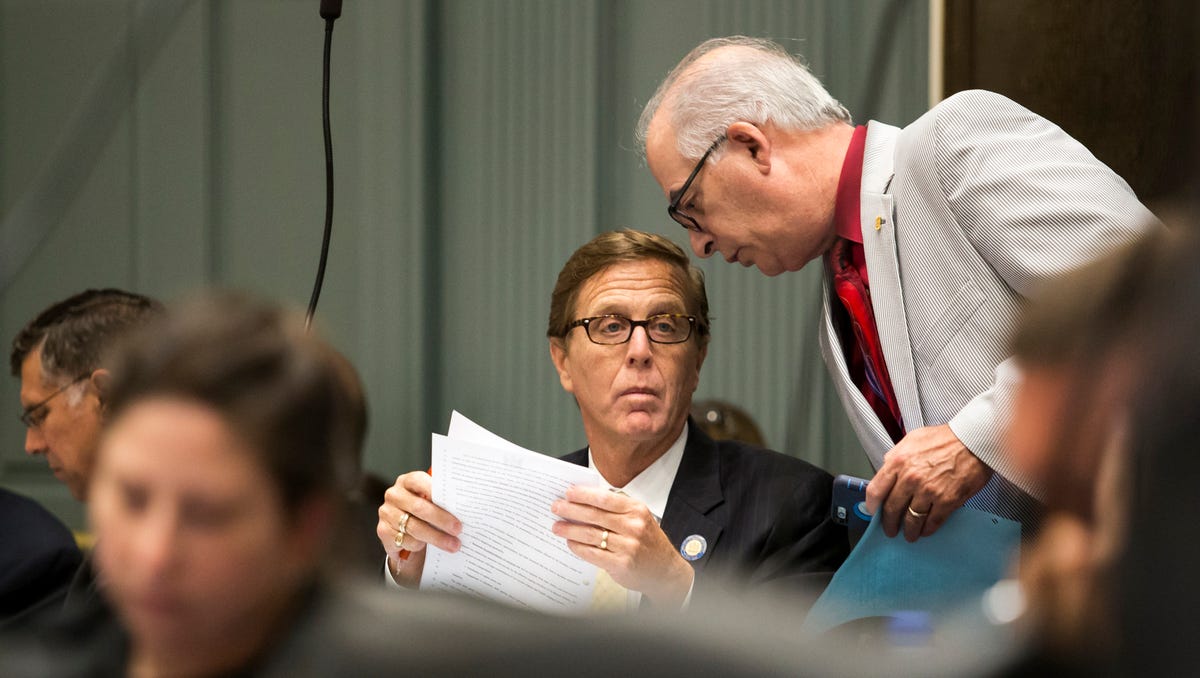South Dakota
11 charged in last month’s unrest at South Dakota State Penitentiary

SIOUX FALLS, S.D. (Dakota News Now) – South Dakota Attorney General Marty Jackley has announced 11 inmates are facing 18 counts total after unrest at the state penitentiary last March.
Six are facing one count of Intentional Damage to Property, and four are facing one count each of Reckless Burning and Burning Within a Structure Where a Person is Lawfully Confined.
The eleventh individual, Joshua Vortherms, is facing two counts of Aggravated Assault Against a Department of Corrections employee, and two counts of Simple Assault Against a Department of Corrections employee. The aggravated assault charges carry a maximum penalty of 25 years in prison.
Jackley said while last month’s actions by inmates here at the state penitentiary were wrong and against the law, the effort wasn’t coordinated. He said the assault on correctional officers wasn’t connected to any of the fires and damage to prison property, and court documents do list the loss of tablet access for messaging and calls as an issue surrounding the assault.
The unrest doesn’t stem from a lack of staffing, as Jackley said it was all confined to one area.
“At least the assault side of it, I don’t believe that staffing would’ve had any affect on what happened,” Jackley said.
Jackley said while it’s only his role to investigate what happened at the state penitentiary and make charges where needed, the documents do point to the issue over the tablets as a potential catalyst for unrest. But he said regardless, the assault, fires and damage shouldn’t have happened.
“The tablet issue, I think instigated or began the disagreement between the guard and the inmate. That guard had nothing to do with whether or not there would be tablets or not,” Jackley said. “I think the inmate’s frustration is what was, at least his reasoning for why he took certain action, which is unacceptable under the law and as my position as Attorney General, we’re addressing it with these felony charges.”
Jackley said he’s avoided using the word “riot” to explain what happened last month. He said even though fires were lit and inmates were trying to smash a gate, it was confined to one area and correctional officers never let it spread outside of that.
“When you look at the property damage on the gates, with them trying to throw the locker through, the inmates never took over control. The fires were from cell to cell, thrown on a wheelchair. So because there was never control lost, I’ve used the word disturbance.”
Jackley said it was his decision to list all 11 inmates in the complaint, and try them all in the same trial. He said this is because while the effort behind the unrest wasn’t connected, it still all stemmed from the same time.
“At this time, there will be one trial, 11 individuals, and 18 counts,” Jackley said.
Copyright 2024 KSFY. All rights reserved.

South Dakota
What is the controversy surrounding South Dakota Governor Kristi Noem and Kim Jong Un?

Encounter with Kim Jong Un: Fact or Fiction?
In her memoir, Noem recounts a purported meeting with North Korean leader Kim Jong Un during her tenure as South Dakota’s representative in Congress. She describes the encounter as part of her global diplomatic engagements. However, doubts arose regarding the accuracy of this assertion, prompting Noem’s spokesperson to clarify that the mention of Kim Jong Un was an error, as mentioned in a report by TIME. Ian Fury stated that the book’s publisher would address the inclusion of the North Korean leader among world figures, attributing it to a mistake.
VP Contender Status and Fallout
Before the controversy surrounding her memoir surfaced, Noem was considered a potential Vice Presidential candidate for former President Donald Trump. However, reports indicate that she had fallen off the shortlist even before these revelations emerged. The book’s controversies have brought further scrutiny to Noem’s political standing and raised questions about her suitability for higher office.
Memoir’s Canine claims
Aside from the purported encounter with Kim Jong Un, Noem’s memoir drew criticism for her admission of shooting her 14-month-old dog, Cricket. Noem justified her actions by citing the dog’s aggressive behavior, which allegedly posed a threat to livestock and people. This revelation sparked outrage among animal welfare advocates and the public, further overshadowing the book’s release.
Defending Her Actions
In response to the backlash, Noem defended her decision to euthanize Cricket, stating that South Dakota law permits the disposal of dogs that attack and kill livestock. She emphasized her commitment to upholding the law and assuming responsibility, whether in ranch management or politics. Despite facing condemnation, Noem reiterated her stance on adhering to legal mandates and fulfilling her obligations as a rancher, pet owner, and community member, according to a TIME magazine article.
Political Career and Legacy
Kristi Noem, a Republican, made history as South Dakota’s first female governor, securing reelection in 2022 after serving in Congress since 2011. However, the controversies surrounding her memoir have raised questions about her leadership and judgment, potentially impacting her political trajectory and legacy.
FAQs
What is the ethnicity of the governor of South Dakota?
Kristi Noem, born to Ron and Corinne Arnold in Watertown, South Dakota, spent her formative years with her siblings on their family ranch and farm in rural Hamlin County. With Norwegian ancestry, Noem graduated from Hamlin High School in 1990, where she was crowned South Dakota Snow Queen.
How many children does the governor of South Dakota have?
Governor Noem is nurturing her three children, Kassidy, Kennedy, and Booker, alongside her husband Bryon, fostering a strong bond rooted in familial love.
Disclaimer Statement: This content is authored by a 3rd party. The views expressed here are that of the respective authors/ entities and do not represent the views of Economic Times (ET). ET does not guarantee, vouch for or endorse any of its contents nor is responsible for them in any manner whatsoever. Please take all steps necessary to ascertain that any information and content provided is correct, updated, and verified. ET hereby disclaims any and all warranties, express or implied, relating to the report and any content therein.
South Dakota
How the state, tribes and federal government are working to curb SD’s syphilis epidemic • South Dakota Searchlight

Tyler Broghammer leaves his office nearly every day armed with a small blue cooler.
Inside is a weapon against South Dakota’s syphilis epidemic: syringes of penicillin. The sexually transmitted infection case manager at Oyate Health Center in Rapid City also carries rapid STI tests and condoms on his near daily drive around town, meeting with people he’s learned may have the disease.
Broghammer is one of two STI case managers at Oyate Health finding and treating people who have syphilis. The organization is one of several working to address the epidemic in South Dakota through collaborative partnerships.
COVID-19 ‘completely overwhelmed’ screening
Syphilis is a bacterial infection most often spread through sex that can be cured, but can cause serious health problems without treatment and can be spread from mothers to unborn babies.
South Dakota experienced a 2,493% increase in adult syphilis cases from the five-year median in 2022, according to the state Department of Health, with 1,504 cases reported — the highest rate of syphilis cases in the country at the time. That was a 90% increase from 2021.
The number of syphilis cases in the state dropped in 2023 to 1,374 cases, according to the state’s infectious disease dashboard.
Syphilis cases are down by 335 cases in the first quarter of this year compared to 2023, according to a state Department of Health spokesperson.
The state had the second highest rate of congenital syphilis in the country in 2022 with 40 cases, which is 351.8 cases per 100,000 births, and was a 150% year-over-year increase. The state saw a 1,233% increase in congenital syphilis among infants from the five-year median in 2022.
The state reported 54 congenital syphilis cases in 2023 and 18 through April of that year. So far this year, there have been nine reported cases.
Syphilis was close to being eradicated in the United States in the 1990s, but cases in South Dakota were increasing in the years prior to the COVID-19 pandemic. Syphilis infections nationwide have climbed rapidly in recent years, reaching a 70-year high in 2022, according to the most recent data from the Centers for Disease Control and Prevention. That rise comes amid a shortage of penicillin, the most effective treatment, due to the nationwide increase in syphilis cases. The shortage is predicted to last until the end of this year.
Hospitals were overwhelmed with treating the coronavirus in 2020 and 2021 and patients were hesitant to get screened or treated for STIs, said Meghan Curry O’Connell, a member of the Cherokee Nation and chief public health officer at the Great Plains Tribal Leaders’ Health Board in Rapid City.
“The whole system we have to make sure people are screened and treated for STIs was completely overwhelmed by COVID, like everything else,” said Curry O’Connell, who is a family physician by training. “Particularly in South Dakota, added challenges included difficulty in accessing care in very rural areas, which compounded the impacts of the pandemic.”
Native American communities hit hardest
Native American communities have been hit the hardest by the epidemic in South Dakota and nationally. About 90% of congenital syphilis cases in South Dakota are among Indigenous babies, according to the state Health Department.
Syphilis causes a range of symptoms, including rashes, sores and hair loss. But if the disease isn’t treated, symptoms may go away even though the infection remains, making it a prolific spreader unless sexually active people are educated on the disease, practice safe sex and are regularly tested, Curry O’Connell said.
The disease can potentially persist for decades if untreated, which can lead to death. If pregnant people are infected, it poses a dangerous risk to their baby; congenital syphilis can cause bone deformities, severe anemia, jaundice, meningitis and even death. In 2022, the CDC recorded 231 stillbirths and 51 infant deaths caused by syphilis nationally, out of 3,761 congenital syphilis cases reported that year.
The Great Plains Tribal Leaders’ Health Board and tribal leaders from North Dakota, South Dakota, Nebraska and Iowa have asked the federal Department of Health and Human Services to declare a public health emergency in their states. A declaration would expand staffing, funding, and access to contact tracing data across their region.
“It’s important to get treated, because we want to prevent any of those outcomes, and it’s just so easy for people to do,” Curry O’Connell said. “Most people just need one shot of penicillin if newly infected.”
The rate of congenital syphilis infections among Native Americans (644.7 cases per 100,000 people in 2022) is comparable to what the rate for the entire U.S. population was in 1941 (651.1) before doctors began using penicillin to cure syphilis, according to KFF Health News.
The risk is especially high for people with limited access to health care.
“If you’re putting off care or don’t have a regular relationship with a doctor, those people are more likely to go untreated,” Curry O’Connell said. “For whatever reason or barrier — if a person can’t get time off of work, they have a distance to travel, they don’t have immediate transportation or anything — it could end up that the symptom goes away.”
How SD entities are addressing the epidemic
Broghammer’s position is funded by a grant from the Indian Health Service. His “boots on the ground” method is the most effective way to treat patients, though it’s also a “grind,” Broghammer said.
Whether due to homelessness, financial or privacy concerns, many patients struggle to find their way to Oyate Health on the west side of Rapid City, Broghammer said. He’ll meet patients anywhere: their home, hotels or even in parking lots.
“Some days I’ll get five to six phone calls reaching out to us, which is great. Other days we’re picking up the phone and trying to locate people but might not find anybody,” Broghammer said. “It’s not just as simple as a phone call and meeting with them. We have a decent sized population of houseless relatives where it’s difficult to find them — no phone or address. Sometimes we literally have nothing to go off of.”
Some other health care systems will test for syphilis but won’t go to the patient’s location.
“Underlying all of this is it’s very resource intensive, especially in rural areas,” Curry O’Connell said. “However, there’s not anything we know of yet that can replace it. Boots on the ground, going out to talk to people, giving testing and doing what needs to be done is just basic public health work, and there’s nothing else that really works better.”
Some tribes and Indian Health Service locations are also sending nurses across South Dakota reservations to find and treat people. The state Department of Health plans to launch its Wellness on Wheels program in May, with five vans traveling across the state to provide basic health care to rural communities — including STI testing, treatment, education, counseling and referrals to community resources.
The vans will also provide pregnancy care services, safe sleep guidance and developmental screening for children, WIC services, maternal depression screening, immunizations and oral health.
“We hope to use these vans several times a week to reach clients who might not have access to one of our physical locations,” said Tia Kafke, media spokesperson for the department, in an emailed statement. “The vans will operate in the winter as much as possible, weather permitting.”
The state, tribes and tribal health board have monthly meetings about syphilis, Curry O’Connell said. IHS recommends every patient age 16 and older be screened for syphilis at least once a year. Pregnant patients should be screened three times during their pregnancy.
Broghammer often receives calls from the state Department of Health with leads on people who tested positive for syphilis.
“They save me time and energy, so I know they’re working their tails off,” Broghammer said.
The state department started piloting a rapid testing partnership with a health care provider in Mission, on the Rosebud Reservation, in December. Fifty patients were tested in the first three months with eight testing positive and being treated for the disease.
The move to rapid testing is an important development, professionals agree, because patients are able to be treated immediately rather than days or weeks later when results come in from laboratories. The department has seven normal testing centers across the state.
The number of syphilis cases in South Dakota has decreased since it peaked in 2022, though it’s still at epidemic levels. Congenital syphilis is only prevented by treating pregnant females. The number of congenital syphilis cases in South Dakota increased from 2022 to 2023.
Prenatal care, intervention key to addressing congenital syphilis
Though Broghammer sees the collaborations’ effect, he said there could be more entities working together in the state to put more boots on the ground.
Curry O’Connell said more effort is needed to test pregnant patients who aren’t receiving prenatal care. Nearly one-third of congenital syphilis cases in the first half of 2023 did not receive prenatal care, according to the state.
Most women still will interact with the health care system at some point during their pregnancy, even if they don’t receive prenatal care. They should be screened with a rapid test at that point, Curry O’Connell said.
“If someone goes into urgent care or goes in for something that’s not even pregnancy related, that would be a place to start, because a lot of women will receive some sort of care during pregnancy,” Curry O’Connell said. “It’s trying to maximize the screening potential of those visits that’s important.”
Education, Broghammer said, is an important tool.
“I think the biggest thing is to just get checked,” Broghammer said. “If you’re sexually active, be safe: get screened and get checked. Be mindful of your partners and safe sex practices.”
GET THE MORNING HEADLINES DELIVERED TO YOUR INBOX
South Dakota
South Dakota Gov. Noem admits error of describing meeting North Korea’s Kim Jong Un in new book

WASHINGTON (AP) — South Dakota Gov. Kristi Noem is releasing a new book called “No Going Back,” but on Friday her office said she would actually be going back to correct some errors — including a false claim that she once met with North Korean leader Kim Jong Un.
The Republican governor’s new book was part of an overt effort to be selected as a running mate for Donald Trump, the presumptive Republican presidential nominee, but it has already faced bipartisan backlash for a story of how she once shot her hunting dog. Then, after scrutiny of her descriptions of meetings with international leaders, her spokesperson Ian Fury said in a statement that it was an error to include Kim in a list of world leaders whom Noem has met — and the publisher would correct any future editions of the book.
Noem’s political prospects were already falling amid widespread disgust for how she recounted killing her 14-month-old wirehaired pointer named Cricket after it had shown aggressive behavior and killed her neighbor’s chickens.
In her soon-to-be-released book, “No Going Back: The Truth on What’s Wrong with Politics and How We Move America Forward,” Noem also describes instances where she has stood up to international leaders — anecdotes that would have bolstered her foreign policy experience — but those were swiftly called into question. She writes about canceling a meeting with French President Emmanuel Macron.
After The Dakota Scout first reported Noem’s descriptions of the meetings, Fury said that the book “has two small errors. This has been communicated to the ghostwriter and editor.”
In addition to the meeting with Kim, Fury said Noem also mistook the dates in which she spoke with former United Nations ambassador Nikki Haley.
“The book has not been released yet, and all future editions will be corrected,” Fury added.
In a section of the book about meeting with international leaders, Noem writes: “Through my tenure on the House Armed Services Committee, I had the chance to travel to many countries to meet with world leaders — some who wanted our help, and some who didn’t.
“I remember when I met with the North Korean dictator Kim Jong Un,” she writes. “I’m sure he underestimated me, having no clue about my experience staring down little tyrants (I’d been a children’s pastor after all).”
The description of such a meeting was quickly challenged and described as implausible by experts on U.S.-North Korea relations. When Noem was a member of the House Armed Services Committee from 2013 to 2015, relations between the two countries were tense and a congressional delegation meeting with Kim would have generated considerable awareness, said Syd Seiler, a former U.S. intelligence officer who spent decades working on the relationship with North Korea.
“Nothing like this happened,” he said, adding that he was working at the White House and State Department during that time period and was not notified of a congressional meeting with Kim.
Noem did join an international congressional trip, known as a codel, to Japan, South Korea and China in 2014.
In the book, Noem also writes that she was “slated to meet with” Macron in November last year while she was in Paris for a conference of European conservative leaders, but canceled when he made comments that she considered “pro-Hamas.”
However, Macron’s office told The Associated Press that no “direct invitation” had been made for Noem to meet the French president, though it did not rule out that she may have been invited to a Paris event that he was also scheduled to attend.
Fury said, “The governor was invited to sit in President Macron’s box for the Armistice Day Parade at Arc de Triomphe. Following his anti-Israel comments, she chose to cancel.”
Meanwhile, Noem is trying to fend off the backlash for writing about shooting her dog as well as a goat.
“Don’t believe the #fakenews media’s twisted spin,” she posted on the social platform X this week. “I had a choice between the safety of my children and an animal who had a history of attacking people & killing livestock.”
Her spokesperson, Fury, also cast scrutiny of the errors in Noem’s book as biased, saying, “The media will, of course, try and make these tiny issues huge.”
Still, members of Congress have poked fun at Noem, with Reps. Jared Moskowitz, a Democrat from Florida; Susan Wild, a Democrat from Pennsylvania; and Nancy Mace, a Republican from South Carolina; launching a Congressional Dog Lovers Caucus this week.
Moskowitz said on X that one of the group’s rules was, “You cannot kill a puppy.”
Copyright 2024 The Associated Press. All rights reserved.
-

 World1 week ago
World1 week agoEU Parliament leaders recall term's highs and lows at last sitting
-

 Politics1 week ago
Politics1 week agoGOP lawmakers demand major donors pull funding from Columbia over 'antisemitic incidents'
-

 World1 week ago
World1 week agoHamas ‘serious’ about captives’ release but not without Gaza ceasefire
-

 Tennessee1 week ago
Tennessee1 week agoHow to buy JC Latham’s Tennessee Titans jersey after 2024 NFL Draft selection
-

 News1 week ago
News1 week agoBoth sides prepare as Florida's six-week abortion ban is set to take effect Wednesday
-

 Politics1 week ago
Politics1 week agoColumbia University’s policy-making senate votes for resolution calling to investigate school’s leadership
-

 Michigan1 week ago
Michigan1 week agoMichigan State football adds DT Brandon Lane from Stephen F. Austin
-

 Politics7 days ago
Politics7 days agoHouse Republicans brace for spring legislative sprint with one less GOP vote




















